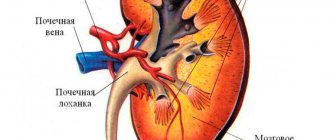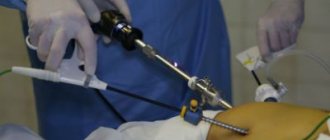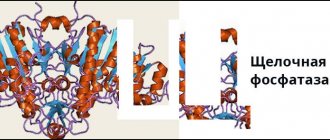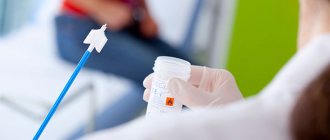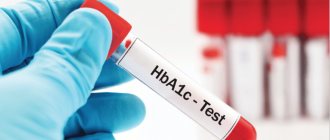COVID package - assessment of the main parameters of the body's protective functions.
Coronavirus infection COVID-19
is a disease caused by a new type of coronavirus, the danger of which is the development of severe acute respiratory syndrome (SARS-CoV-2).
One of the main difficulties is that very often coronavirus occurs without symptoms, and if there are symptoms, there is a high probability of it being disguised as other diseases: flu, pneumonia, sore throat.
Transmission of infection occurs primarily through airborne droplets and contact.
The incubation period for coronavirus infection in most cases is up to 10 days.
The most common symptoms that start the disease
– respiratory (fever, cough, sore throat). Other symptoms include a runny nose, loss of smell, headache, weakness, diarrhea and nausea. At the same time, like respiratory symptoms, loss of smell or taste cannot be called a direct “indicator” of COVID-19.
The risk group includes: elderly people; the risk of complications is especially high in patients over 70 years of age; — persons with chronic respiratory diseases (COPD, asthma); — persons with excess body weight and metabolic disorders; persons with somatic diseases of the endocrine and cardiovascular systems: especially arterial hypertension, diabetes, atrial fibrillation.
It is mandatory to undergo a comprehensive laboratory examination to assess the functional state of the organs and systems that are most often affected by COVID-19. Also, after an infection, it is important not to miss the development of complications. A comprehensive examination will identify disorders that affect overall well-being and determine the cause of prolonged recovery from illness.
Content:
- How long can tests after coronavirus not meet normal standards?
- What tests need to be taken after COVID-19
- The most common abnormalities after Covid-19
- Is it always necessary to take D-dimer?
Blood tests after Covid reflect all the mechanisms of development of the disease: an abnormal reaction of the immune system, a viral-bacterial inflammatory process, increased clotting. It is very important to evaluate the changes occurring in the body over time in order to understand whether a person is recovering, or whether there is a threat to his health in general or a specific internal organ in particular.
In addition to the injuries characteristic of COVID-19, each patient may have disorders that are associated with his individual characteristics. Therefore, if a doctor tells you to undergo a comprehensive examination, you should definitely listen to his recommendation. Blood counts make it possible to study the functional state of systems and organs during and after the disease, and to identify residual disorders.
By contacting medical specialists, you will find out what tests to take after coronavirus, and what specialists you should consult with in the near future. Our rehabilitation center employs highly qualified doctors who know the specifics of recovery from such severe viral pathologies as Covid-19. If you want to quickly return to your normal lifestyle and forget about the loss of strength and poor health forever, call us and sign up for a consultation.
Complexes with this research
Male anti-aging diagnostics Monitoring of key indicators in men aged 40+ 13,300 RUR Composition
Male check-up No. 1 39 studies for annual preventive examination 18,570 RUR Composition
For those at risk of COVID-19 Diagnosis of diseases complicating the course of coronavirus infection RUR 4,510 Composition
IN OTHER COMPLEXES
- Advanced male anti-aging diagnostics RUB 33,710
- Advanced women's anti-aging diagnostics RUB 28,680
- Healthy interest 4,250 RUR
- Nutritionist recommends RUB 7,570
- Fitness control of sports nutrition 5 140 RUR
How long can tests after coronavirus not meet normal standards?
After suffering a moderate or mild infection, the recovery period takes on average about thirty days. In severe cases of the disease (especially if Covid-19 was accompanied by dangerous complications), rehabilitation lasts longer - up to three to six months.
Given that the virus has not been sufficiently studied, scientists have not yet fully figured out how it affects humans. Therefore, doctors cannot yet name the exact time frame within which patients should be fully rehabilitated. This is a reason not to ignore even the slightest ailments and to constantly “keep your finger on the pulse” after discharge from the hospital. If a person who is recovering seems to be getting worse, they should immediately consult an experienced doctor. Self-medication during and after Covid-19 is unacceptable.

What tests need to be taken after COVID-19
Conventionally, research programs used in working with “post-Covid” people can be divided into three large groups - minimal, basic and advanced diagnostics. The more severe the disease, the more extensive and comprehensive the medical examination should be.
The minimum diagnostic program is aimed at:
- assessment of the extent of residual inflammation;
- study of the intensity of coagulation processes.
For this purpose we hand over:
- UAC (with ESR);
- blood for C-reactive protein and D-dimer.
If the viral disease was of moderate severity, doctors offer a wider list of laboratory tests in order to assess the functions of the vital systems of the body as qualitatively as possible and obtain detailed information about the state of health.
In addition to the above-mentioned studies, the recovering person is tested for:
- prothrombin (an indicator characterizing coagulation);
- 25-OH vitamin D (allows you to understand whether there is a vitamin D deficiency);
- content of potassium, sodium, chlorine, Ca2+, lactate dehydrogenase level (considered for studying heart function);
- total bilirubin, liver enzymes (to study liver activity);
- creatinine, urea (indicators describing the condition of the kidneys);
- albumin, glucose (characterize the course of carbohydrate and protein metabolism).
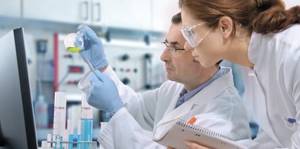
The expanded program is used to provide medical care to people who have suffered a very serious coronavirus infection and have encountered life-threatening complications during the illness. In this case, laboratory tests are added to the studies from the main diagnostic plan to study the levels of:
- ferritin;
- fibrinogen;
- antithrombin III;
- magnesium;
- direct and total bilirubin;
- cystatin C;
- protein fractions;
- total protein;
- antibodies to nuclear antigens.
Additionally, a clotting indicator such as thrombin time is examined, and autoimmune processes are screened.
Biochemistry of the enzyme
ALT is a catalyst that accelerates the transport of amino acid groups. The result of the reaction in which ALT is involved is the formation of pyruvic and glutamic acids. These are the most important substances that are required for the normal functioning of almost all cells. The reaction involving ALT occurs only in the presence of the coenzyme - vitamin B6.
ALT is located inside cells, its content in the blood is much lower. Some cells have more of the enzyme than others. So, most of this substance is found in the kidneys and liver, lower concentrations are observed in the heart, skeletal muscles, and pancreas. In men, ALT activity is higher than in women.
In liver diseases, the activity of ALT changes sharply, cells are destroyed and the enzyme quickly enters the bloodstream, and its increased concentration can be recorded.
The most common abnormalities after Covid-19
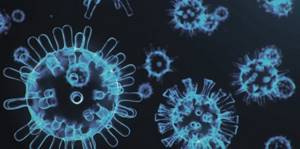
With a mild and asymptomatic course, pathological changes in the CBC are most often not detected. Even in most patients who have had a moderate infection, the concentration of leukocytes is normal. Among the possible disorders faced by people who have reacted acutely and negatively to a viral attack:
- Leukopenia. An abnormal condition in which the level of white blood cells decreases and is less than 4*10^9/l. The problem is present in approximately 30% of patients after COVID-19.
- Lymphopenia. Also associated with a drop in white blood cell levels. But with this diagnosis, the proportion of white blood cells is less than 19%, which is very bad. Such results indicate progressive immunodeficiency and confirm a severe course of the viral infection. Lymphopenia is diagnosed in more than 80% of people who have had coronavirus with complications such as pneumonia, heart failure, diabetes, etc.
- Moderate decrease in platelets. The diagnosis is characterized by increased bleeding, the appearance of bruises on the body, and large bruises. A drop in platelets is caused by the body's immune reaction in response to the proliferation of dangerous viral agents that react with the surface of platelets. Many people who died due to Covid-19 were diagnosed with disseminated intravascular coagulation (DIC), a condition with severe platelet deficiency.
- Increased hematocrit (the ratio between blood cells and the amount of plasma). The indicator becomes high with fever, dehydration, diarrhea, and frequent vomiting. It is necessary to maintain the hematocrit within normal limits. For this purpose, infusion therapy should be carried out.
Any negative changes after coronavirus can be eliminated, so it is important not to get upset or despair if the results of laboratory diagnostics upon admission to a rehabilitation center are far from ideal. Specialists will offer effective medications and physical procedures that will help the body recover faster.
Addresses of Helix laboratories in Moscow:
Helix at Moscow, st. Academician Oparina, 4, bldg. 1 Mon-Fri 7:30 - 12:00, Sat-Sun 9:00 - 12:00
Helix at Moscow, Beskudnikovsky Blvd., 8, bldg. 4 Mon-Fri 7:00 - 11:30, Sat-Sun 9:00 - 11:30
Helix at Moscow, st. Brateevskaya, 18, bldg. 1 Mon-Fri 7:00 - 11:30, Sat-Sun 9:00 - 11:30
Helix at Moscow, Volgogradsky Prospekt, 116, bldg. 1 Mon-Sun 7:30 – 12:30
Helix at Moscow, st. Taininskaya, 17, bldg. 1 Mon-Sun 7:30 – 12:30
Helix at Moscow, Velozavodskaya st., 6a Mon-Sun 7:30 - 12:30
Helix at Moscow, st. Academician Koroleva, 5 Mon-Fri 7:30 - 20:00, Sat-Sun 8:00 - 19:00
Helix at Moscow, Lazorevyi pr-d, 3 Mon-Fri 7:30 - 11:30, Sat-Sun 8:00 - 11:30
Helix at Moscow, st. Vavilova, 91, bldg. 1 Mon-Fri 7:00 – 19:00 8:00 – 17:00
Helix at Moscow, st. Kravchenko, 16, bldg. 2 Mon-Sun 7:00 – 19:00
Helix at Moscow, st. Dmitry Ulyanov, 23, bldg. 1 daily
Helix at Moscow, st. Korneya Chukovskogo, 3 Mon-Fri 8:00 - 14:00, Sat-Sun 8:00 - 13:00
Helix at Moscow, st. Istrinskaya, 5 Mon-Fri 7:00 - 19:00, Sat 7:30 - 16:00, Sun 8:00 - 15:30
Helix at Moscow, st. Alexandra Monakhova, 96, bldg. 2 Mon-Fri 7:30 - 14:30, Sat-Sun 9:00 - 14:00
Helix at Moscow, st. Perovskaya, 66, bldg. 4 Mon-Fri 7:30 - 11:00, Sat 9:00 - 11:00, closed Sun
Helix at Moscow, st. Milashenkova, 7, bldg. 1 Mon-Fri 7:30 - 10:00, Sat-Sun 8:30 - 10:00
Helix at Moscow, Khoroshevskoe shosse, 66 Mon-Fri 7:00 - 11:30, Sat 8:00 - 11:30, Sun 9:00 - 10:30
Helix at Moscow, st. Novokosinskaya, 24, bldg. 1 Mon-Fri 7:00 - 11:30, Sat-Sun 9:00 - 11:30
Helix at Moscow, Lomonosovsky pr., 33, bldg. 1 daily 7:00 – 19:00
Helix at Moscow, st. Abramtsevskaya, 30, bldg. 1 Mon-Sat 9:00 - 18:00, Sun 9:00 - 15:00
Helix at Moscow, st. 1st Vladimirskaya, 8 Mon-Fri 8:00 - 19:00, Sat 9:00 - 16:00, closed Sun
Helix at Moscow, st. Krasnoproletarskaya, 16 Mon-Sun 9:00 – 17:00
Helix at Moscow, Leninsky Prospekt, 123 Mon-Sat 10:00 - 19:00, closed Sun
Helix at Moscow, st. Malaya Pirogovskaya, 13 Mon-Sun 9:00 – 18:00
Helix at Moscow, st. 2-ya Filevskaya, 6 Mon-Fri 8:00 - 10:30, Sat-Sun 9:00 - 10:30
Helix at Moscow, st. Fruktovaya, 12 Mon-Fri 8:00 - 20:00, Sat-Sun 9:00 - 18:00
Helix at Moscow, st. Yaltinskaya, 10 Mon-Fri 8:00 - 20:00, Sat-Sun 9:00 - 16:00
Helix at Moscow, st. Northern Chertanovo, bldg. 805 Mon-Sat 8:00 – 16:30, closed Sun
Helix at Moscow, st. Chertanovskaya, 14 Mon-Fri 8:00 – 16:00, closed Sat-Sun
Is it always necessary to take D-dimer?
Today it is reliably known that coronavirus leads to the formation of blood clots, which worsens the course of the viral infection. To avoid missing dangerous complications, D-dimer is assessed in all clients. This indicator is believed to help recognize the risk of thrombosis.
Actually this is not true. D-dimer describes how intensively the process of thrombosis occurs, but it is irrational to consider it purely as a criterion for the development of thrombosis.
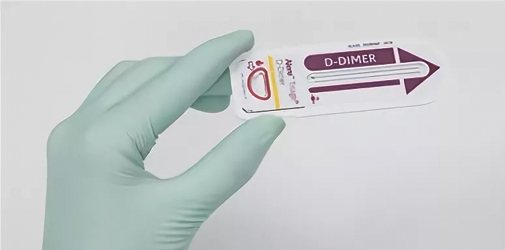
This is due to the fact that with any active inflammatory process, thrombus formation increases, but in most cases the body, using its own protective blood system, independently destroys the forming microthrombi. This suggests that increased D-dimer during Covid-19 is not a direct indication for the prescription of anticoagulants.
Anticoagulant therapy should be preceded by a comprehensive laboratory test, and not just blood donation for this indicator. It should be remembered that unjustified use of anticoagulants increases the risk of bleeding.
If during treatment in a hospital a tendency to form blood clots is established, a patient with Covid-19 with a high D-dimer will definitely be prescribed anticoagulants. It is possible that they will have to be taken for some time after discharge, but strictly under the supervision of a doctor and regularly performed laboratory diagnostics.
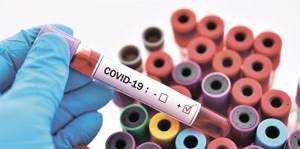
As practice shows, anticoagulants after COVID-19 should be used by people with thrombophlebitis, arterial hypertension, varicose veins, and a history of myocardial infarction. These patients are at risk, so the D-dimer value for them is very important when assessing the risk of blood clots.
You can contact the rehabilitation center with any questions regarding your health during the recovery period after coronavirus. We will advise you on how to treat you further and will do everything possible to ensure that your health is fully restored. Call.
Reference values:
In the CELT clinic, alanine aminotransferase is changed in units/l.
An increase in level is observed in newborns - the normal value can reach 56 in the first six months of life.
For men, the maximum permissible threshold is 41, and for women - 31.
Reasons for increasing values
An increase in level may be associated with the following pathologies:
- Liver diseases (including viral hepatitis, toxic hepatitis, steatohepatitis, liver cirrhosis).
- Myocardial diseases.
- Muscle injuries.
- Jaundice (of various etiologies).
- Alcohol abuse.
- Some metabolic pathologies.
In addition, the results are affected by taking certain drugs that inhibit liver function. It is recommended to inform your doctor about long-term use of any medications.

